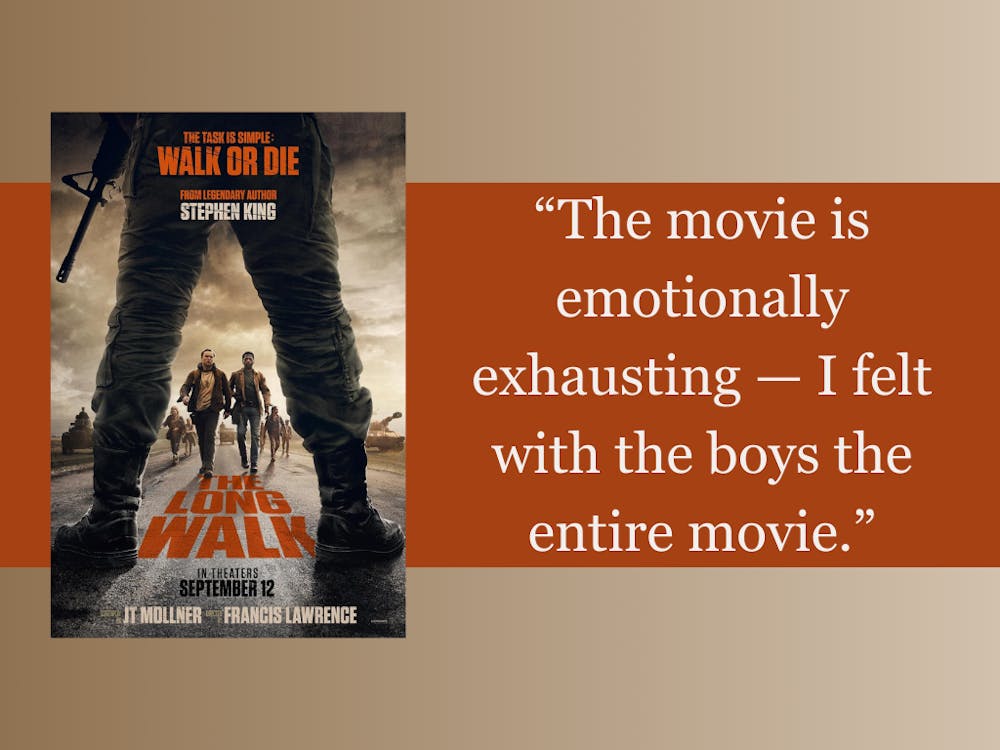Fifty young men. One, long, long road. Every time one’s speed dips below three miles per hour, they’re issued a warning. Three warnings, and a person gets a ticket. In the end, only one remains. The Major (Mark Hamill), a grizzled army man who heads the Long Walk, tells the contestants as much in the opening minutes of the movie.
Of course, “ticket” is only in-world slang for death. Execution, via a bullet or two straight to the head. Forty-nine boys will die, but him who remains will receive one wish for anything he desires. That’s in addition to a significant sum of cash.
The film follows Ray Garraty, “Maine’s Own” Walker (Cooper Hoffman). As he walks, he forges friendships with the other Walkers. Garraty, along with Pete McVries (David Jonsson), Hank Olsen (Ben Wang) and Art Baker (Tut Nyuot), dub themselves “The Musketeers.”
Over the course of the movie, many are killed. Some for retaliation, some for simple exhaustion, some for taking too long to defecate. Some just sit down and die, their last bit of rebellion before the long, black end.
In the first half, the Musketeers ask each other what they will do with their Wish. Most of the Walkers will wish for sex or money, but McVries opts for something different. He decides that with his wish, he will decree that the Long Walk will forevermore crown two winners, so that he who wins will not do so at the price of all his friends.
When Garraty explains his plan to ask for a carbine and kill The Major, McVries advocates for seeing the light and not wasting a wish on vengeance, when one could use it for hope. He tells Garraty that it takes a sad sort of man to kill another.
“There are three great truths in the world,” Olson said, in a line ripped directly from the source material. “And they are a good meal, a good screw, and a good shit and that’s all!”
In a way, the movie champions the small things. It asks us to question how things would be if we didn’t have a good meal, a chance to sit down or more than three days to live. “The Long Walk” calls us to think, not in terms of months or years or decades. It calls us to think in moments.
“The only guarantee that you have as a human being is that you are going to die,” Garraty said. “And, if you’re lucky, you get to choose how you spend those last moments.”
While “The Long Walk” channels King’s emotions and opinions on the Vietnam War and the U.S. military draft, the story is not a direct analogy or parable. Instead, it puts life into perspective.
We are all on a Long Walk — all on a constant pilgrimage. Except for us, there is no winner, no escape from the metaphorical, or cruelly actual, bullet. Recent events have shown us this, with the assassination of Charlie Kirk, the murder of Iryna Zarutska and the school shooting of Evergreen High School in Colorado. “The Long Walk” remains as poignant and relevant today as it was during the Vietnam War, and its subsequent release in ’79.
Though the film mostly stuck to the source material, it diverged in a few ways. For one, the stakes are higher in the book. Instead of walking at three miles per hour, the boys have to walk at four. The number of Walkers is also doubled, at 100, versus the film’s 50. However, the ending is the biggest change.
Enjoy what you're reading?
Signup for our newsletter
It’s a startling movie, perfectly content to show the gore of a splattered head and the nastiness of a walk that never ends. It shocks you, from the very first death, and never lets up. The movie is emotionally exhausting — I felt with the boys the entire movie.
Felt the fear when the first young man died because a charley horse seized his leg. Felt pain as shoe soles wore out, and feet became bloody pulps. Felt hollowness as the numbers dwindled. Felt panic as a steep grade rose out of the mist, and gunshots rang out like gruesome fireworks.
And felt, despite it all, the warmth and hope of singular moments, of friendships that inspired each other, and kept each other moving, walking ever forward, even into the black and dreamless sleep of death.




